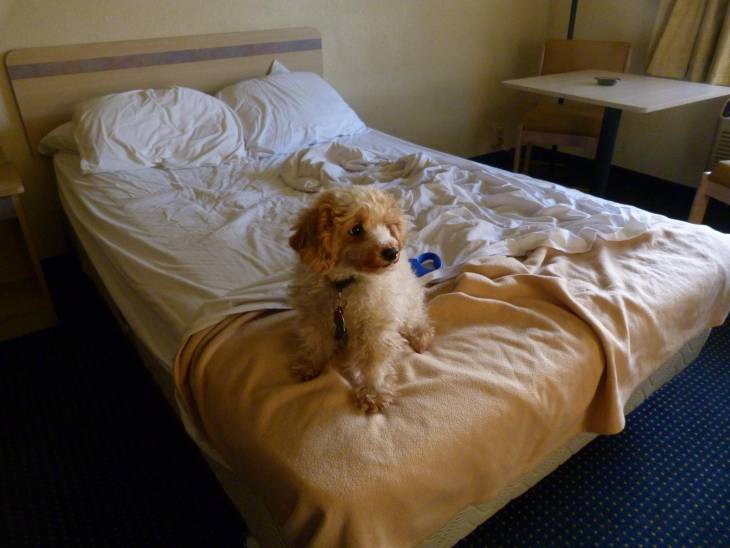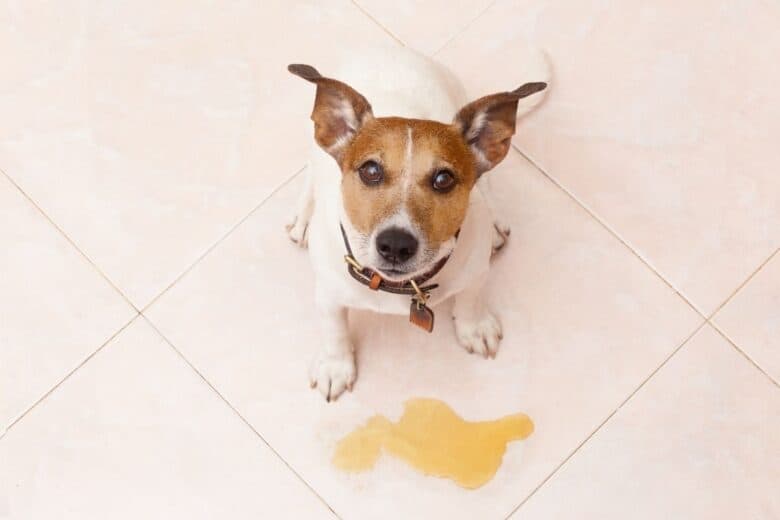Table Of Content

If your dog is urinating on their bedding, replace it with a waterproof bed, or use a pad beneath it to soak up urine. Also make sure you wash the bed frequently – ideally at a higher temperature – to prevent secondary infections or skin problems. AKC is a participant in affiliate advertising programs designed to provide a means for sites to earn advertising fees by advertising and linking to akc.org.

Fear And Anxiety
– To prevent your dog from peeing in the same spot, thoroughly clean and deodorize the area to remove any lingering scent markers. You can also use natural deterrents, such as citrus sprays or vinegar solutions, to discourage your dog from returning to the same spot. – Punishing your dog for accidents in the house is not recommended, as it can create fear and anxiety. Instead, focus on positive reinforcement and redirecting their behavior to the appropriate bathroom area. EmergencyVetsUSA.com is for informational purposes only and should not be used for medical advice and should not replace your family veterinarian’s advice. Additionally the information provided here is not a substitute for professional medical advice.
Oakland female dog keeps peeing in…

But normal aging doesn’t make a dog upset, anxious, miserable, or confused! Your vet can make a diagnosis and make sure Fido gets the right treatment. There are medical options available to improve the functioning of the brain. Yes, you can train your dog to use a litter box or pee pad indoors, especially if you live in a high-rise apartment or have limited outdoor space. Introduce the litter box or pee pad gradually, use positive reinforcement, and provide consistent opportunities for your dog to use the designated potty area. Punishing your dog for peeing in the house is not recommended, as it can create fear, anxiety, and confusion.
Concerned About Your Pet's Unusual Behavior?
Sometimes, changes in diet or the introduction of specific dog shampoos for sensitive & itchy skin might alleviate the problem. Other behavioral reasons for increased urination include anxiety or significant shifts in their living environment or routines. Two very common symptoms of diabetes in older dogs are increased thirst and increased urination. So, if your older dog is peeing in the house and seems to be extra-thirsty, diabetes could potentially be the reason why your old dog suddenly started peeing in the house.
Kidney Disease in Dogs: Signs, Symptoms, and Treatment - American Kennel Club
Kidney Disease in Dogs: Signs, Symptoms, and Treatment.
Posted: Thu, 29 Jun 2023 07:00:00 GMT [source]
Don’t get mad, get prepared… learn how to get dog urine stains out of carpets and furniture! If your dog’s incontinence is caused by a medical issue, first consult your vet to learn about the treatment options – hormone medication can be very successful. Urethral Sphincter Mechanism Incompetence can affect up to one out of five spayed female dogs and develops an average of 2.9 years after the dog has been spayed.
Puppies, in particular, may not yet have the bladder control to hold their urine for extended periods of time. It’s important to establish a routine for potty breaks and consistently reward your dog for going outside. If your dog is older and suddenly starts peeing in the house, it could be a sign of a medical issue such as a urinary tract infection or bladder stones. Serious medical issues such as kidney disease, diabetes, or dementia (Old dog syndrome) often affect older dogs (age 7-8 and older). Peeing indoors happens to be one of the symptoms often observed with these conditions. Other medical conditions causing indoor peeing – such as urinary tract infections – are relatively benign when treated quickly.
By addressing the underlying issue and working with Sparky on obedience training, Tom managed to curtail this unwanted behavior. Marking behavior can be one of the trickier aspects of understanding why a male dog might be peeing inside the house all of a sudden. This is a natural instinct for many male dogs, but it can become an issue when it happens inside the home. They may be sick and need medical treatment to resolve a problem like urinary tract infections, or they may be having a behavioral response. If your dog suddenly decides to start engaging in inappropriate urination, the first thing you need to do is identify the cause. It might be obvious, for example, if you just got a new puppy that is disrupting your older dog’s home environment.
Due to the increased threat of underlying disease, we always suggest having them assessed by a vet if they suddenly begin to pee in the house. Older dogs are more at risk of developing underlying disease that impacts their behavior, and urinating in the home is a common change that we see. If none of the options above seem to fit your dog’s situation, it is very possible that they have developed a urinary tract infection. Luckily pet health insurance is designed to help pet parents cover the cost of their dog’s care. Insurance can help pay for veterinary visits, diagnostic testing, and any medications or other treatment your pet may need. If the dog is used to relieving himself at specific times during the day and his schedule is changed, he might have a hard time coping with it.
What is the best way to clean urine or fecal deposits?
Urinary pH imbalance may allow bacteria to thrive and crystals or stones to form in the urinary tract. Symptoms include increased thirst and frequency of urination, an urgency to urinate, bloody urine, or inappropriate urination. Male dogs may urinate more frequently when they have prostate conditions like benign prostatic hyperplasia (BPH), prostatitis, or prostate cancer. About half of intact male dogs will have BPH by age four, but many will have no symptoms. Prostatitis is a bacterial infection usually occurring in intact dogs, while prostate cancer is seen more frequently in neutered males. Puppies and older dogs have at least one thing in common—both tend to have accidents inside the house.
If your furry friend has made an accident in the house suddenly, you should not punish them for doing so. You should however go back to the basics and try to address the fundamental issues. As dogs get elderly, they are prone to develop cognitive issues such as canine dementia and senility. This will affect your pup’s intellectual reasoning and they may urinate inappropriately around the house. Dementia (or Canine Cognitive Disorder) often makes dogs feel dazed and confused. They lose their bearings and forget which ways the doors open – you might notice them pacing and staring at walls.
If you need to leave your dog at home unsupervised, make sure they're crated or in an enclosed place where you know they won’t mark. If the dog has a history of marking, continue this practice when you get new furniture or other upright items in your home to prevent marking from happening again. Age-related cognitive changes cannot be reversed, your veterinarian can prescribe treatments to support brain health. Be sure to really assess your home and routine for any changes that could have caused them stress, and reach out to your veterinary team if you think your pup needs additional help. As we discussed above, some dogs will pee inside the house if they are undergoing stress of any kind. If your dog only pees inside the house when they are unable to go outside for long periods, this could just mean they were unable to hold it any longer.
Other health issues, such as kidney failure, tend to crop up in old age as well. This is another reason to get your veterinarian involved early and often. In some cases, dementia can be somewhat managed with medications and supplements. Many people living with senior dogs that have urinary issues also choose to use doggie diapers or line the dog's bedding and other frequented areas with absorbent pads. Dog diapers and belly bands—a wrap designed to fit around a male dog’s waist to catch urine—are two products that help keep your house clean if your senior dog is having accidents.

No comments:
Post a Comment